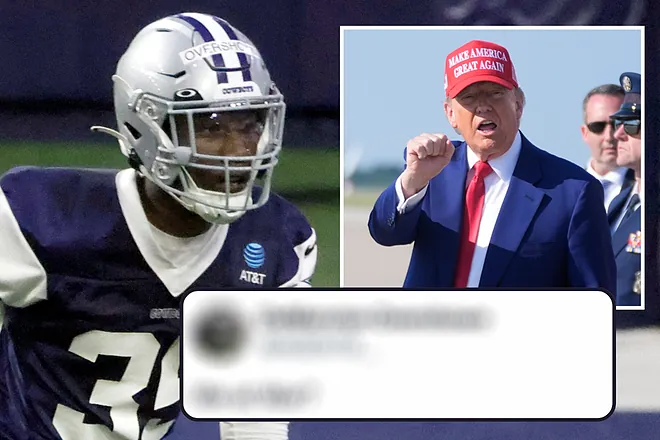Dallas Cowboys star linebacker Micah Parsons made headlines off the field this week when he became one of the first NFL players to publicly address the mounting global tension between the United States and Iran. In a heartfelt message shared across social media, Parsons expressed concern, reflection, and a deep sense of responsibility as a public figure in a time of international uncertainty. While professional athletes often shy away from commenting on geopolitics, Parsons’ remarks have ignited a broader conversation—not just among fans and sports analysts, but also within the cultural and political spheres where sports and society intersect.
The rising strain between the U.S. and Iran has been building in recent weeks due to a combination of diplomatic breakdowns, escalating rhetoric, military posturing, and renewed sanctions. As headlines warn of a possible standoff with global implications, many Americans have turned to public figures for perspective and solidarity. Micah Parsons, who has never been one to shy away from speaking his mind, responded with a post that mixed vulnerability, patriotism, and a call for peace.
In his statement, Parsons wrote: “As someone blessed with a platform, I can’t stay silent when so many people around the world are living in fear. I’m a proud American and always will be, but I also believe in peace, in life, and in doing what we can to protect innocent people—both here and overseas. The world feels tense, and my heart is heavy.” The post, which quickly went viral, resonated with fans across political lines, garnering hundreds of thousands of likes and retweets.
For Parsons, the moment was personal. Sources close to the linebacker noted that he has family members with military backgrounds and has often expressed admiration for the sacrifices made by U.S. service members. In interviews over the years, he has mentioned his deep respect for the armed forces, often drawing parallels between the discipline, teamwork, and mental toughness required in football and those demanded in the military. His post was not a condemnation of policy, but rather a plea for caution and humanity amid rising global tensions.
The NFL community, long a barometer of American culture, responded with a mix of support and reflection. Several of Parsons’ teammates, including quarterback Dak Prescott and defensive end DeMarcus Lawrence, reposted his message with their own words of encouragement. Prescott added: “Real talk. We suit up every Sunday, but we know there are people out there who risk their lives every day for something much bigger. Let’s hope cooler heads prevail.”
Others across the sports world followed suit. NBA stars, WNBA champions, and even retired Olympians shared similar sentiments. What began as a single post evolved into a larger dialogue about the role of athletes in times of geopolitical uncertainty. For some, it’s a reminder that sports are never truly removed from the real world—that even in moments of distraction and entertainment, players carry with them a sense of social awareness and civic duty.
Parsons’ message was not without its detractors. Some critics online questioned whether an athlete should wade into foreign affairs or express opinions on international diplomacy. But many came to his defense, noting the long history of athletes taking stands on political and global issues—from Muhammad Ali’s opposition to the Vietnam War to LeBron James’ commentary on systemic injustice. Parsons’ remarks fit into that tradition, albeit more measured and focused on unity rather than opposition.
Off the field, Parsons has steadily built a reputation not only as one of the league’s most dominant defenders but also as a thoughtful and grounded individual. Raised in Harrisburg, Pennsylvania, and molded by his time at Penn State, he often speaks about the importance of family, community, and character. His rise to stardom hasn’t changed his core values, according to those close to him. He remains deeply invested in youth mentorship, philanthropy, and civic engagement, regularly hosting events for underserved communities in both Dallas and his hometown.
It’s perhaps this authenticity that gave weight to his statement. Fans didn’t see it as a publicity stunt or a shallow attempt to stay relevant in news cycles—it felt genuine. The emotional resonance of his post sparked dialogue among younger fans, many of whom turned to social media to express their own fears and hopes. Comments poured in from high school athletes, college students, and service members alike. “Thanks for using your voice,” one Navy sailor wrote. “We’re all watching this unfold, and it means something to know you’re thinking about us.”
In the days following his post, reporters at Cowboys’ mandatory minicamp asked Parsons about his statement. True to form, he remained composed and thoughtful in his response. “Look, I’m not trying to be a politician,” he said. “I’m an athlete. But I’m also a human being. I have friends, family, teammates who come from all over. I just want peace. I want people to feel safe. Football teaches us about unity—about coming together despite differences. That’s all I’m trying to say.”



